语法总结--过去进行时(全)
- 格式:doc
- 大小:44.00 KB
- 文档页数:5
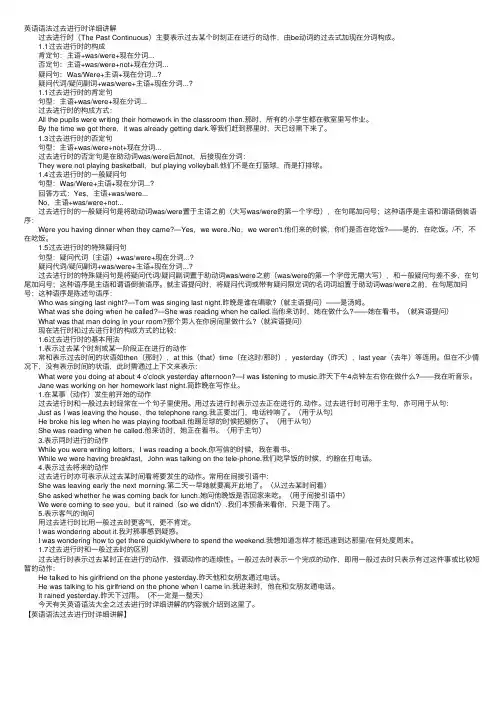
英语语法过去进⾏时详细讲解 过去进⾏时(The Past Continuous)主要表⽰过去某个时刻正在进⾏的动作,由be动词的过去式加现在分词构成。
1.1过去进⾏时的构成 肯定句:主语+was/were+现在分词... 否定句:主语+was/were+not+现在分词... 疑问句:Was/Were+主语+现在分词...? 疑问代词/疑问副词+was/were+主语+现在分词...? 1.1过去进⾏时的肯定句 句型:主语+was/were+现在分词... 过去进⾏时的构成⽅式: All the pupils were writing their homework in the classroom then.那时,所有的⼩学⽣都在教室⾥写作业。
By the time we got there,it was already getting dark.等我们赶到那⾥时,天已经⿊下来了。
1.3过去进⾏时的否定句 句型:主语+was/were+not+现在分词... 过去进⾏时的否定句是在助动词was/were后加not,后接现在分词: They were not playing basketball,but playing volleyball.他们不是在打篮球,⽽是打排球。
1.4过去进⾏时的⼀般疑问句 句型:Was/Were+主语+现在分词...? 回答⽅式:Yes,主语+was/were... No,主语+was/were+not... 过去进⾏时的⼀般疑问句是将助动词was/were置于主语之前(⼤写was/were的第⼀个字母),在句尾加问号;这种语序是主语和谓语倒装语序: Were you having dinner when they came?—Yes,we were./No,we weren't.他们来的时候,你们是否在吃饭?——是的,在吃饭。
/不,不在吃饭。
1.5过去进⾏时的特殊疑问句 句型:疑问代词(主语)+was/were+现在分词...? 疑问代词/疑问副词+was/were+主语+现在分词...? 过去进⾏时的特殊疑问句是将疑问代词/疑问副词置于助动词was/were之前(was/were的第⼀个字母⽆需⼤写),和⼀般疑问句差不多,在句尾加问号;这种语序是主语和谓语倒装语序。
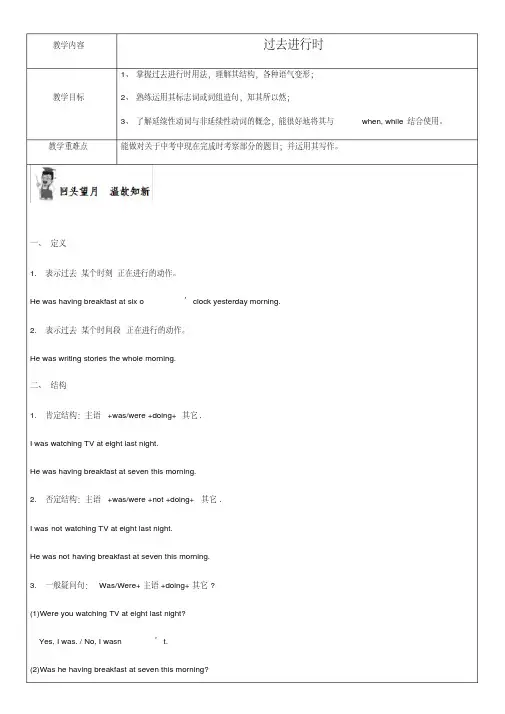
教学内容过去进行时教学目标1、掌握过去进行时用法,理解其结构,各种语气变形;2、熟练运用其标志词或词组造句,知其所以然;3、了解延续性动词与非延续性动词的概念,能很好地将其与when, while结合使用。
教学重难点能做对关于中考中现在完成时考察部分的题目;并运用其写作。
一、定义1.表示过去某个时刻正在进行的动作。
He was having breakfast at six o’clock yesterday morning.2.表示过去某个时间段正在进行的动作。
He was writing stories the whole morning.二、结构1.肯定结构:主语+was/were +doing+其它.I was watching TV at eight last night.He was having breakfast at seven this morning.2.否定结构:主语+was/were +not +doing+其它.I was not watching TV at eight last night.He was not having breakfast at seven this morning.3.一般疑问句:Was/Were+主语+doing+其它?(1)Were you watching TV at eight last night?Yes, I was. / No, I wasn’t.(2)Was he having breakfast at seven this morning?Yes, he was. / No, he wasn’t.4.特殊疑问句:疑问词+was/were+主语+doing+其它?三、时间标志词1.at+具体时刻+过去时间(at five last Saturday)2.at this time+过去时间(at this time yesterday)3.过去时间段(from nine to ten last evening)4.at that time/moment5.when &while引导的过去时间状语从句考点一现在分词要点归纳:动词ing 的基本变化规则1. __________________, 如do—doing2.___________________, 如have—having, come—coming3. __________________________________________________如: shop—shopping, skip—skipping, run--- running口诀:停止游泳,___________ _____________开始跑步和跳绳,___________ _____________ ___________到达商店购物,___________ _____________忘记坐下切蛋糕。
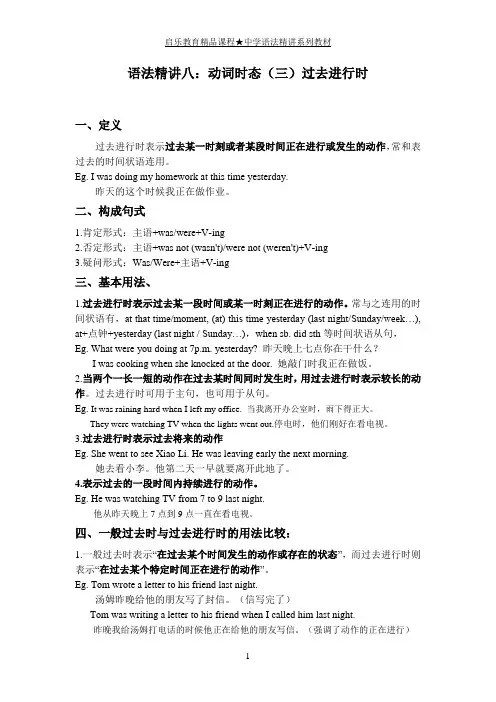
语法精讲八:动词时态(三)过去进行时一、定义过去进行时表示过去某一时刻或者某段时间正在进行或发生的动作,常和表过去的时间状语连用。
Eg. I was doing my homework at this time yesterday.昨天的这个时候我正在做作业。
二、构成句式1.肯定形式:主语+was/were+V-ing2.否定形式:主语+was not (wasn't)/were not (weren't)+V-ing3.疑问形式:Was/Were+主语+V-ing三、基本用法、1.过去进行时表示过去某一段时间或某一时刻正在进行的动作。
常与之连用的时间状语有,at that time/moment, (at) this time yesterday (last night/Sunday/week…), at+点钟+yesterday (last night / Sunday…),when sb. did sth等时间状语从句,Eg. What were you doing at 7p.m. yesterday? 昨天晚上七点你在干什么?I was cooking when she knocked at the door. 她敲门时我正在做饭。
2.当两个一长一短的动作在过去某时间同时发生时,用过去进行时表示较长的动作。
过去进行时可用于主句,也可用于从句。
Eg. It was raining hard when I left my office. 当我离开办公室时,雨下得正大。
They were watching TV when the lights went out.停电时,他们刚好在看电视。
3.过去进行时表示过去将来的动作Eg. She went to see Xiao Li. He was leaving early the next morning.她去看小李。
他第二天一早就要离开此地了。
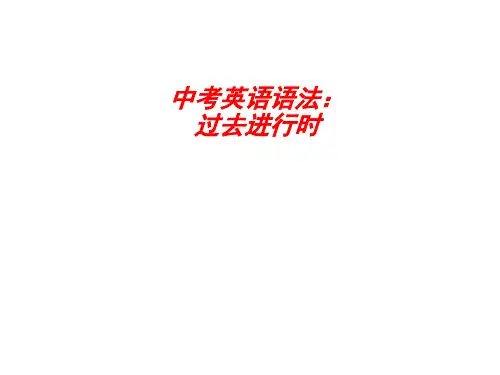
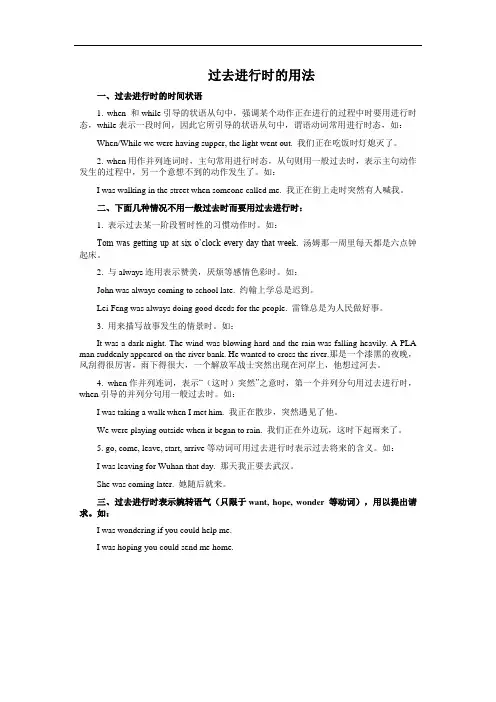
过去进行时的用法一、过去进行时的时间状语1. when 和while引导的状语从句中,强调某个动作正在进行的过程中时要用进行时态,while表示一段时间,因此它所引导的状语从句中,谓语动词常用进行时态,如:When/While we were having supper, the light went out. 我们正在吃饭时灯熄灭了。
2. when用作并列连词时,主句常用进行时态,从句则用一般过去时,表示主句动作发生的过程中,另一个意想不到的动作发生了。
如:I was walking in the street when someone called me. 我正在街上走时突然有人喊我。
二、下面几种情况不用一般过去时而要用过去进行时:1. 表示过去某一阶段暂时性的习惯动作时。
如:Tom was getting up at six o’clock every day that week. 汤姆那一周里每天都是六点钟起床。
2. 与always连用表示赞美,厌烦等感情色彩时。
如:John was always coming to school late. 约翰上学总是迟到。
Lei Feng was always doing good deeds for the people. 雷锋总是为人民做好事。
3. 用来描写故事发生的情景时。
如:It was a dark night. The wind was blowing hard and the rain was falling heavily. A PLA man suddenly appeared on the river bank. He wanted to cross the river.那是一个漆黑的夜晚,风刮得很厉害,雨下得很大,一个解放军战士突然出现在河岸上,他想过河去。
4. when作并列连词,表示“(这时)突然”之意时,第一个并列分句用过去进行时,when引导的并列分句用一般过去时。
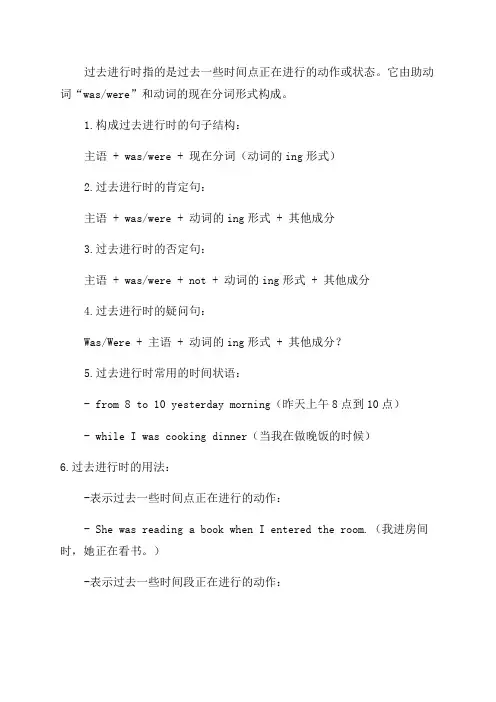
过去进行时指的是过去一些时间点正在进行的动作或状态。
它由助动词“was/were”和动词的现在分词形式构成。
1.构成过去进行时的句子结构:主语 + was/were + 现在分词(动词的ing形式)2.过去进行时的肯定句:主语 + was/were + 动词的ing形式 + 其他成分3.过去进行时的否定句:主语 + was/were + not + 动词的ing形式 + 其他成分4.过去进行时的疑问句:Was/Were + 主语 + 动词的ing形式 + 其他成分?5.过去进行时常用的时间状语:- from 8 to 10 yesterday morning(昨天上午8点到10点)- while I was cooking dinner(当我在做晚饭的时候)6.过去进行时的用法:-表示过去一些时间点正在进行的动作:- She was reading a book when I entered the room.(我进房间时,她正在看书。
)-表示过去一些时间段正在进行的动作:- We were watching a movie from 8 to 10 yesterday evening.(昨天晚上8点到10点我们正在看电影。
)- They were working in the office all day yesterday.(他们昨天一整天都在办公室工作。
)-表示过去一些时间点正在进行的状态:- She was feeling sick yesterday.(她昨天感觉不舒服。
)- The children were sleeping when their parents arrived home.(孩子们在他们父母回家时正在睡觉。
)需要注意的是,过去进行时通常用于过去故事的描写中,它与一般过去时常常同时出现,表示过去一些时间点正在发生的动作或状态。
此外,过去进行时通常和表示具体时间的状语连用,以明确动作发生的时间。
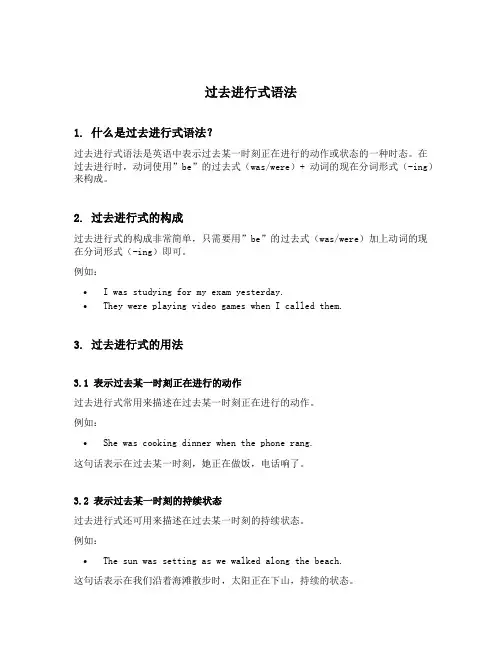
过去进行式语法1. 什么是过去进行式语法?过去进行式语法是英语中表示过去某一时刻正在进行的动作或状态的一种时态。
在过去进行时,动词使用”be”的过去式(was/were)+ 动词的现在分词形式(-ing)来构成。
2. 过去进行式的构成过去进行式的构成非常简单,只需要用”be”的过去式(was/were)加上动词的现在分词形式(-ing)即可。
例如:•I was studying for my exam yesterday.•They were playing video games when I called them.3. 过去进行式的用法3.1 表示过去某一时刻正在进行的动作过去进行式常用来描述在过去某一时刻正在进行的动作。
例如:•She was cooking dinner when the phone rang.这句话表示在过去某一时刻,她正在做饭,电话响了。
3.2 表示过去某一时刻的持续状态过去进行式还可用来描述在过去某一时刻的持续状态。
例如:•The sun was setting as we walked along the beach.这句话表示在我们沿着海滩散步时,太阳正在下山,持续的状态。
3.3 表示过去某一时刻的计划或安排过去进行式还可以用来表示过去某一时刻的计划或安排。
例如:•We were going to the movies last night.这句话表示我们昨晚计划去电影院。
4. 注意事项在使用过去进行式时,需要注意以下几点:4.1 过去进行式与一般过去时的区别过去进行式强调过去某一时刻正在进行的动作或状态,而一般过去时则强调过去发生的动作或状态。
例如:•She was studying when I called her.(过去进行时)•She studied in college.(一般过去时)第一句强调她在我打电话给她的时候正在学习,第二句则强调她在大学里学习过。
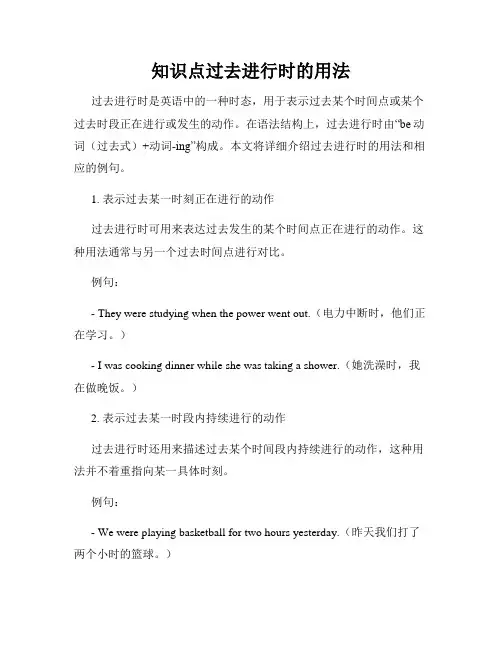
知识点过去进行时的用法过去进行时是英语中的一种时态,用于表示过去某个时间点或某个过去时段正在进行或发生的动作。
在语法结构上,过去进行时由“be动词(过去式)+动词-ing”构成。
本文将详细介绍过去进行时的用法和相应的例句。
1. 表示过去某一时刻正在进行的动作过去进行时可用来表达过去发生的某个时间点正在进行的动作。
这种用法通常与另一个过去时间点进行对比。
例句:- They were studying when the power went out.(电力中断时,他们正在学习。
)- I was cooking dinner while she was taking a shower.(她洗澡时,我在做晚饭。
)2. 表示过去某一时段内持续进行的动作过去进行时还用来描述过去某个时间段内持续进行的动作,这种用法并不着重指向某一具体时刻。
例句:- We were playing basketball for two hours yesterday.(昨天我们打了两个小时的篮球。
)- He was reading a book all evening.(他整晚都在读书。
)3. 表示过去某个时间点的背景动作过去进行时可以用于描述过去的某个时间点,强调其背景下正在进行的动作。
这种用法常常与一般过去时连用,用来提供更完整的背景信息。
例句:- When I arrived at the party, everyone was dancing.(当我到达晚会时,大家都在跳舞。
)- The phone rang while she was having a meeting.(她开会的时候电话响了。
)4. 表示过去愿望和计划过去进行时还可以表达过去的愿望和计划,表示当时的期望或打算。
例句:- I was hoping to visit Paris, but I couldn't afford the trip.(当时我希望能去巴黎,但是支付不起旅费。
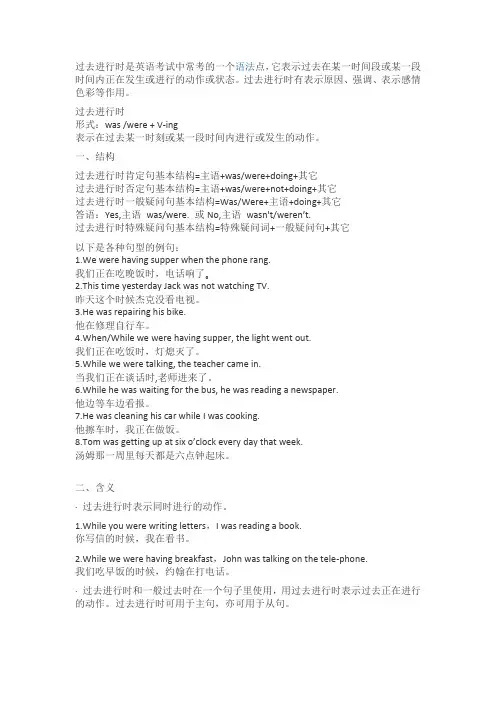
过去进行时是英语考试中常考的一个语法点,它表示过去在某一时间段或某一段时间内正在发生或进行的动作或状态。
过去进行时有表示原因、强调、表示感情色彩等作用。
过去进行时形式:was /were + V-ing表示在过去某一时刻或某一段时间内进行或发生的动作。
一、结构过去进行时肯定句基本结构=主语+was/were+doing+其它过去进行时否定句基本结构=主语+was/were+not+doing+其它过去进行时一般疑问句基本结构=Was/Were+主语+doing+其它答语:Yes,主语was/were. 或No,主语wasn't/weren’t.过去进行时特殊疑问句基本结构=特殊疑问词+一般疑问句+其它以下是各种句型的例句:1.We were having supper when the phone rang.我们正在吃晚饭时,电话响了。2.This time yesterday Jack was not watching TV.昨天这个时候杰克没看电视。
3.He was repairing his bike.他在修理自行车。
4.When/While we were having supper, the light went out.我们正在吃饭时,灯熄灭了。
5.While we were talking, the teacher came in.当我们正在谈话时,老师进来了。
6.While he was waiting for the bus, he was reading a newspaper.他边等车边看报。
7.He was cleaning his car while I was cooking.他擦车时,我正在做饭。
8.Tom was getting up at six o’clock every day that week.汤姆那一周里每天都是六点钟起床。
二、含义·过去进行时表示同时进行的动作。
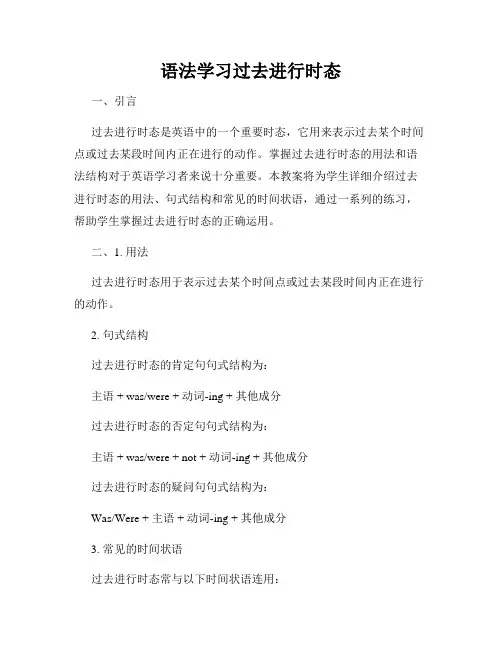
语法学习过去进行时态一、引言过去进行时态是英语中的一个重要时态,它用来表示过去某个时间点或过去某段时间内正在进行的动作。
掌握过去进行时态的用法和语法结构对于英语学习者来说十分重要。
本教案将为学生详细介绍过去进行时态的用法、句式结构和常见的时间状语,通过一系列的练习,帮助学生掌握过去进行时态的正确运用。
二、1. 用法过去进行时态用于表示过去某个时间点或过去某段时间内正在进行的动作。
2. 句式结构过去进行时态的肯定句句式结构为:主语 + was/were + 动词-ing + 其他成分过去进行时态的否定句句式结构为:主语 + was/were + not + 动词-ing + 其他成分过去进行时态的疑问句句式结构为:Was/Were + 主语 + 动词-ing + 其他成分3. 常见的时间状语过去进行时态常与以下时间状语连用:- at this time yesterday(昨天的这个时候)- at 6 o'clock last night(昨晚6点)- all afternoon(整个下午)- the whole time(一直)- when(当...的时候)三、练习题1. 选择适当的动词形式填空:1) We ________ (watch) a movie when she called.2) What ________ you ________ (do) when I arrived?3) They ________ (have) dinner when we came back home.2. 改正句子中的错误:1) I was cooking when the phone rings.2) She was studying all night last night.3) What were you do at 7 o'clock yesterday?3. 根据提示写出句子:1) What were you doing at 9 o'clock yesterday morning? (I / write a letter)2) She called while we were having dinner. (What / she do?)3) They were playing basketball when it started to rain. (Who / start to rain?)四、总结通过本节课的学习,我们了解了过去进行时态的基本用法、句式结构和常见的时间状语。
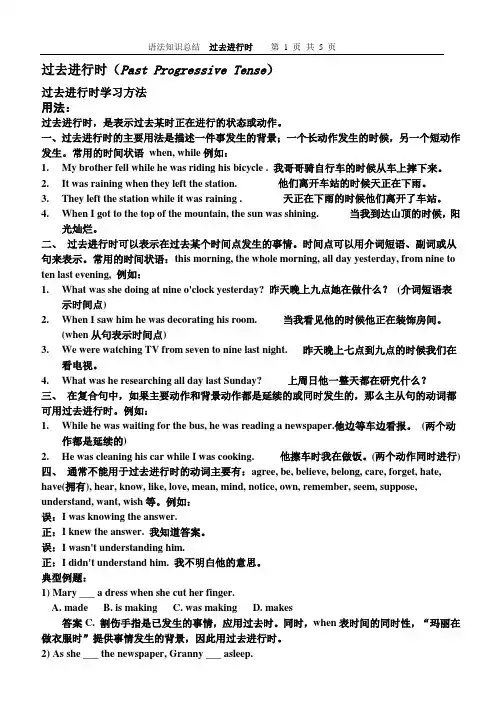
过去进行时(Past Progressive Tense)过去进行时学习方法用法:过去进行时,是表示过去某时正在进行的状态或动作。
一、过去进行时的主要用法是描述一件事发生的背景;一个长动作发生的时候,另一个短动作发生。
常用的时间状语when, while例如:1.My brother fell while he was riding his bicycle . 我哥哥骑自行车的时候从车上摔下来。
2.It was raining when they left the station. 他们离开车站的时候天正在下雨。
3.They left the station while it was raining . 天正在下雨的时候他们离开了车站。
4.When I got to the top of the mountain, the sun was shining. 当我到达山顶的时候,阳光灿烂。
二、过去进行时可以表示在过去某个时间点发生的事情。
时间点可以用介词短语、副词或从句来表示。
常用的时间状语:this morning, the whole morning, all day yesterday, from nine to ten last evening, 例如:1.What was she doing at nine o'clock yesterday? 昨天晚上九点她在做什么?(介词短语表示时间点)2.When I saw him he was decorating his room. 当我看见他的时候他正在装饰房间。
(when从句表示时间点)3.We were watching TV from seven to nine last night. 昨天晚上七点到九点的时候我们在看电视。
4.What was he researching all day last Sunday? 上周日他一整天都在研究什么?三、在复合句中,如果主要动作和背景动作都是延续的或同时发生的,那么主从句的动词都可用过去进行时。
英语语法什么是过去进行时过去进行时是英语中的一种时态,用来描述过去某个时间点或时间段正在进行的动作或状态。
它通常由“was/were + 现在分词”构成。
在本文中,我将详细介绍过去进行时的用法、结构、常见例句以及注意事项。
一、过去进行时的用法:过去进行时表示在过去某个时间点或时间段正在进行的动作或状态。
它强调了过去某个时刻的持续性。
过去进行时通常用来描述以下情况:1. 过去某个时间点的持续动作:- I was studying when she called me.(她给我打电话时,我正在学习。
)- They were playing soccer at 3 p.m. yesterday.(昨天下午3点他们在踢足球。
)2. 过去某个时间段的持续状态:- She was living in Paris for two years.(她在巴黎住了两年。
)- We were working on the project all day yesterday.(昨天整天我们都在做这个项目。
)3. 过去的计划或安排:- They were going to the party, but it was canceled.(他们本想去参加派对,但是派对取消了。
)- I was meeting my friend for lunch, but he got sick.(我本来要和朋友吃午饭,但是他病了。
)4. 过去的态度或感受:- She was loving every minute of her vacation.(她度假的每一分钟都很享受。
)- They were hating the rainy weather.(他们讨厌那阴雨连绵的天气。
)二、过去进行时的结构:过去进行时的结构由“was/were + 现在分词”构成。
下面是各种人称和数的过去进行时的构成:1. 肯定句结构:- I was studying.- You were working.- He/she/it was sleeping.- We/you/they were playing.2. 否定句结构:- I was not studying.- You were not working.- He/she/it was not sleeping.- We/you/they were not playing.3. 疑问句结构:- Was I studying?- Were you working?- Was he/she/it sleeping?- Were we/you/they playing?4. 疑问句的否定回答:- Yes, I was./No, I wasn't.- Yes, you were./No, you weren't.- Yes, he/she/it was./No, he/she/it wasn't.- Yes, we/you/they were./No, we/you/they weren't.三、过去进行时的常见例句:下面是一些常见的过去进行时的例句,以帮助你更好地理解其用法和结构:1. They were watching a movie when I arrived.(我到达时,他们正在看电影。
过去进行时过去进行时可以表示过去某一个时刻或者过去一段时间内正在进行的动作。
结构:was/were doing一、时间状态1.常常和表示过去的时间状语连用Then 那时,at the time在那时This time yesterday 昨天的这个时候At ten yesterday 昨天晚上十点2.用另一个表示过去的动作来确定时间状态比如:when you called me yesterday.例句:what are you doing ?I was watching TV at that time. 昨天晚上十点钟你在干嘛,那个时间我正在看电视。
He was reading when i came in .当我进来时,他在读书。
I was doing my homework while my parents were watching TV。
3.过去进行时常常和always 等表示频率的副词连用,表示过去频繁发生的习惯性动作。
有感情色彩。
例句:Lily was always changing her mind。
莉莉总在改变主意。
(不以为然)He was always ringing me up. 他老是给我打。
(厌烦)She was always working. 她总是不停地干活。
(赞扬)二、一般过去时和过去进行时的区别They played basketball yesterday.(一般过去时)They were playing basketball at 4:00PM yesterday.(过去进行时)强调动作在过去某个时间或某段时间正在进行时,不明确是否结束,用过去进行时。
一般过去时的时间点没有过去进行时的时间点明确。
例句:He ate all the cakes yesterday .他昨天吃完了蛋糕。
He was eating cakes at this time yesterday.昨天这个时候他正在吃蛋糕。
过去进行时:1.构成:were / was + 现在分词2.功能:(1)表示过去某一时刻或阶段正在发生的动作。
?. I was playing chess at 8 yesterday evening.?. When I arrived, they were watching TV.?. They were doing housework this time last week.(2)用于条件状语从句中表示过去将来进行的动作。
?. She told me to wake him up if she was sleeping.?. I asked my friend to warn me about it as long as I was driving too fast.测试精编1. My brother ________ while he ________ his bicycle and hurt himself.A. fell / was ridingB. feel / were ridingC. had fallen / rodeD. had fallen / was riding2. He ________ his leg as he ________ in a football match.A. broke / playedB. was breaking / was playingC. broke / was playingD. was breaking / played3. -My father will be here tomorrow. -I thought that he ________ today.A. was corningB. is comingC. will comeD. comes4. Jack was going out of the shop when he collided with an old woman who ________ in.A. comeB. was comingC. had been comingD. had come5. Michike couldn't come to the telephone when Mr. Smith called her because she ________ in the lab.A. had been workingB. has been workingC. was workingD. worked(后设答案,大家不要偷看哦~(*^__^*) 嘻嘻……)KEYS1. A2. C3. A4. B5. C1。
高中英语语法八个时态归纳总结英语语法中的时态是指动词形态变化来表示不同的时间状态。
在英语语法中,共有八个时态,包括一般现在时、一般过去时、一般将来时、现在进行时、过去进行时、过去将来进行时、现在完成时和过去完成时。
这里将对这八个时态进行归纳总结,以帮助高中学生更好地理解和运用这些时态。
1. 一般现在时(Simple Present)一般现在时表示经常性、习惯性的动作或真理,也用于表示主语在现在的状态或职业。
例句:- I eat breakfast every morning.(我每天早上吃早餐。
)- The sun rises in the east.(太阳从东方升起。
)- She works as a teacher.(她是一名教师。
)2. 一般过去时(Simple Past)一般过去时表示过去某个时间发生或存在的动作或状态。
例句:- I studied English yesterday.(昨天我学习了英语。
)- They went to the beach last summer.(他们去年夏天去了海滩。
)- She lived in London for five years.(她在伦敦住了五年。
)3. 一般将来时(Simple Future)一般将来时表示将来某个时间要发生的动作或存在的状态。
例句:- I will go shopping tomorrow.(我明天要去购物。
)- They are going to visit their grandparents next month.(他们下个月要去看望他们的祖父母。
)- She is going to study abroad after graduation.(她毕业后打算出国留学。
)4. 现在进行时(Present Continuous)现在进行时表示现在正在进行的动作或状态。
例句:- I am reading a book right now.(我现在正在读一本书。
一般过去时和过去进行时的语法总结过去时态是英语中用来表示已经发生或已经完成的动作、事件或状态的一种时态。
在过去时态中,一般过去时和过去进行时是两种常用的时态形式。
下面将对一般过去时和过去进行时进行语法总结和概述。
一、一般过去时(Simple Past Tense)的用法一般过去时表示过去发生的一次性或完成的动作、事件、状态,或者过去的习惯性、持续性动作。
1. 表示过去某个时间发生的动作或事件。
例如:- I went to the park yesterday.(我昨天去了公园。
)- He studied English last night.(他昨晚学习了英语。
)2. 表示过去的习惯性动作或状态。
例如:- She played tennis every week.(她每周打网球。
)- We lived in that house for five years.(我们在那所房子里住了五年。
)3. 表示过去的状态或特征。
例如:- It was sunny yesterday.(昨天天晴。
)- He was a doctor when he was young.(他年轻时是个医生。
)4. 与时间状语连用。
一般过去时常与表示过去的时间状语连用,如:yesterday(昨天)、last week(上周)、in 1999(在1999年)、when I was a child(当我还是个孩子时)等。
二、过去进行时(Past Continuous Tense)的用法过去进行时表示过去某个时间正在进行的动作或状态。
1. 表示过去某个时间点正在进行的动作。
例如:- They were playing basketball at 5 p.m. yesterday.(昨天下午5点他们正在打篮球。
)- I was cooking dinner when she called me.(她给我打电话时,我正在做晚饭。
)2. 表示过去的一段时间内正在进行的动作。
过去进行时(Past Progressive Tense)过去进行时学习方法用法:过去进行时,是表示过去某时正在进行的状态或动作。
一、过去进行时的主要用法是描述一件事发生的背景;一个长动作发生的时候,另一个短动作发生。
常用的时间状语when, while例如:1.My brother fell while he was riding his bicycle . 我哥哥骑自行车的时候从车上摔下来。
2.It was raining when they left the station. 他们离开车站的时候天正在下雨。
3.They left the station while it was raining . 天正在下雨的时候他们离开了车站。
4.When I got to the top of the mountain, the sun was shining. 当我到达山顶的时候,阳光灿烂。
二、过去进行时可以表示在过去某个时间点发生的事情。
时间点可以用介词短语、副词或从句来表示。
常用的时间状语:this morning, the whole morning, all day yesterday, from nine to ten last evening, 例如:1.What was she doing at nine o'clock yesterday? 昨天晚上九点她在做什么?(介词短语表示时间点)2.When I saw him he was decorating his room. 当我看见他的时候他正在装饰房间。
(when从句表示时间点)3.We were watching TV from seven to nine last night. 昨天晚上七点到九点的时候我们在看电视。
4.What was he researching all day last Sunday? 上周日他一整天都在研究什么?三、在复合句中,如果主要动作和背景动作都是延续的或同时发生的,那么主从句的动词都可用过去进行时。
例如:1.While he was waiting for the bus, he was reading a newspaper.他边等车边看报。
(两个动作都是延续的)2.He was cleaning his car while I was cooking. 他擦车时我在做饭。
(两个动作同时进行)四、通常不能用于过去进行时的动词主要有:agree, be, believe, belong, care, forget, hate, have(拥有), hear, know, like, love, mean, mind, notice, own, remember, seem, suppose, understand, want, wish等。
例如:误:I was knowing the answer.正:I knew the answer. 我知道答案。
误:I wasn't understanding him.正:I didn't understand him. 我不明白他的意思。
典型例题:1) Mary ___ a dress when she cut her finger.A. madeB. is makingC. was makingD. makes答案C. 割伤手指是已发生的事情,应用过去时。
同时,when表时间的同时性,“玛丽在做衣服时”提供事情发生的背景,因此用过去进行时。
2) As she ___ the newspaper, Granny ___ asleep.A. read; was fallingB. was reading; fellC. was reading; was fallingD. read;fell答案B.句中的as = when,while,意为"当……之时"。
描述一件事发生的背景时,用过去进行;一个长动作发生的时候,另一个短动作发生。
句意为"在她看报纸时,奶奶睡着了。
"句中的fell (fall的过去时),是系动词,后跟形容词,如:fall sick。
过去进行时和一般过去时的区别一.一般过去时叙述旧事,过去进行时描述背景。
A、一般过去时1)叙述过去状态、动作或事件He went to Beijing the other day.(带具体时间)2)表示过去的习惯a) would ,used to与过去时would 表间断性不规则的习惯,常带频率时间used to 表一贯性有规律的习惯They used to meet and would sometimes exchange one or two words.He smoked a lot two years ago. (过去行为)b) Would 用于文中不用于句首,只表过去习惯。
Used to 表今昔对比的含义,叙述习惯动作可与would 换用。
When he was a boy , he would often go there . (叙述过去)She isn't what she used to be. (今昔对比)c) 表示状态时一般只用used toTom used to be fat /There used to stand a tree there. (状态)d) was (were) used to +ving表示“合适于,适应于…..”He used to work at night . (“习惯”表经常)He was used to working at night. (习惯表适应)3)表示过去的经历,平行动作,依此事件用一般过去时。
He sat there and listened to the radio.(依此发生)4)表示客气委婉的语气,用于情态动词,助动词和want , wonder , hope 等How did you like the film? / Could you help me?B. 过去进行时-表示在过去某阶段或某一时刻正在发生What were you doing at 8:30 last night? (过去某时刻正在发生)-短暂性动词用过去进行时表示按计划、打算During that time he was going with us.(表示打算)-与always ,often ,usually 等连用表喜爱,讨厌等感情色彩。
He was always Changing his mind.二、过去进行时与一般过去时的区别A. 进行时表某一行为的“片断”一般时表示行为的“整体”和存在的状态。
I was reading the book at that time. (未读完,“读”的片段)I read the book yesterday. (已读完,表整个“读”)B、一般持续时间状语多与进行时连用It was raining all night.(优先用was raining ,rained 为持续动词,故也可使用)He was writing a letter the whole of afternoon.(短暂动词与持续时间连用,表反复,连续发生,不可用一般过去时)C、while 时间状语从句中用短暂动词时只能用进行时。
例:He broke a chair while he was jumping up and down.D、While 所在主从句动作大致持续相等时主从句一般都用进行时,但若是持续动词可都用一般过去时,两个动作一长一短时短的用一般时,长的用进行时。
I was cooking the dinner while he was playing the piano.(平行)I cooked the dinner while he played the piano.I saw him while I was walking to the station.三、英语中有四类动词一般不用进行时(不用现在进行时和过去进行时)1)表心理状态、情感的动词,如love ,hate ,like ,care ,respect ,please ,prefer ,know 等,若用进行时则词意改变。
I’m forgetting it . (=beginning to forget )2)表存在、状态的动词,如appear ,exist ,lie ,remain ,stand ,seem等3)表感觉的动词,如see ,hear ,feel ,smell ,sound ,taste等.4)表一时性的动词,如accept ,allow ,admit ,decide ,end ,refuse ,permit ,promise等。
四、例题考题1 As she ____the newspaper ,Granny ____ asleep .(95)A. read /was falling B .was reading /fell C. Was reading /was falling D. read/fell分析时间从句的动作长,而“入睡”动作短,故前者用过去进行时,而较短动词用一般过去时,选B考题2 Tom ___ into the house when no one ___ .A. slipped/was lookingB. Had slipped /lookedC. slipped/had lookedD. was slipping /looked分析此题先要理解好when ,表“此时”,说明主句中slipped是较短行为,而look 是较长行为的片断,即汤姆溜进房子,此时没人瞧见,故选A为正确。
过去进行时(Past Progressive Tense)句型S + was/were +V-ing…例A:She was doing her homework at 8:30 yesterday evening.(昨天傍晚八点半她正在做家庭作业。
)例B:We were having supper at that time.(那个时候我们正在吃晚饭。
)解说如例1所示,在单句中使用过去进行时来表达时必须把该动作正在进行中的时间表明清楚,否则就不合逻辑了。
例如:I was taking a bath yesterday. (错)(昨天我正在洗澡——昨天24小时都正在洗澡吗?)所以本句应该如例1来表达,或者用一般过去时表达如下:I took a bath yesterday.(昨天我洗了澡。